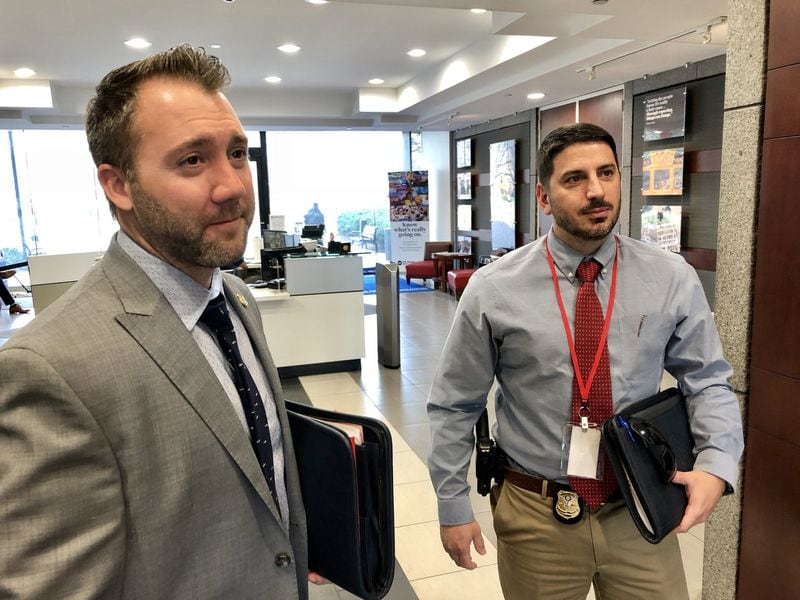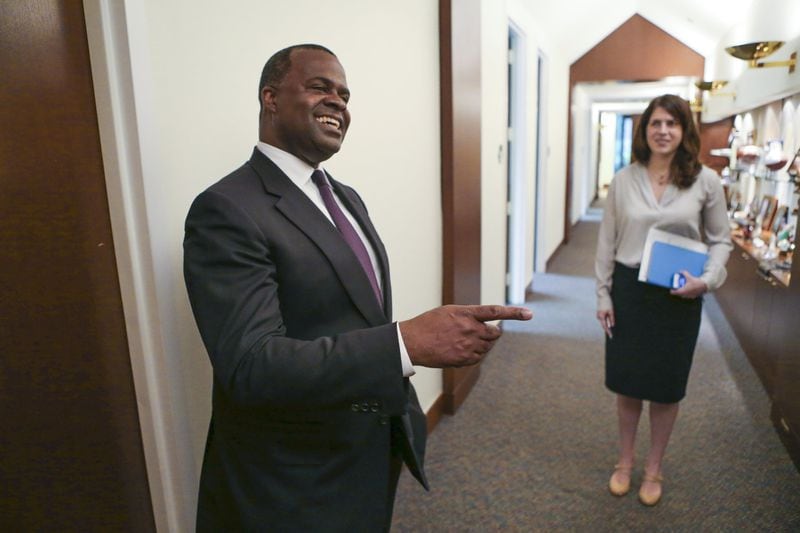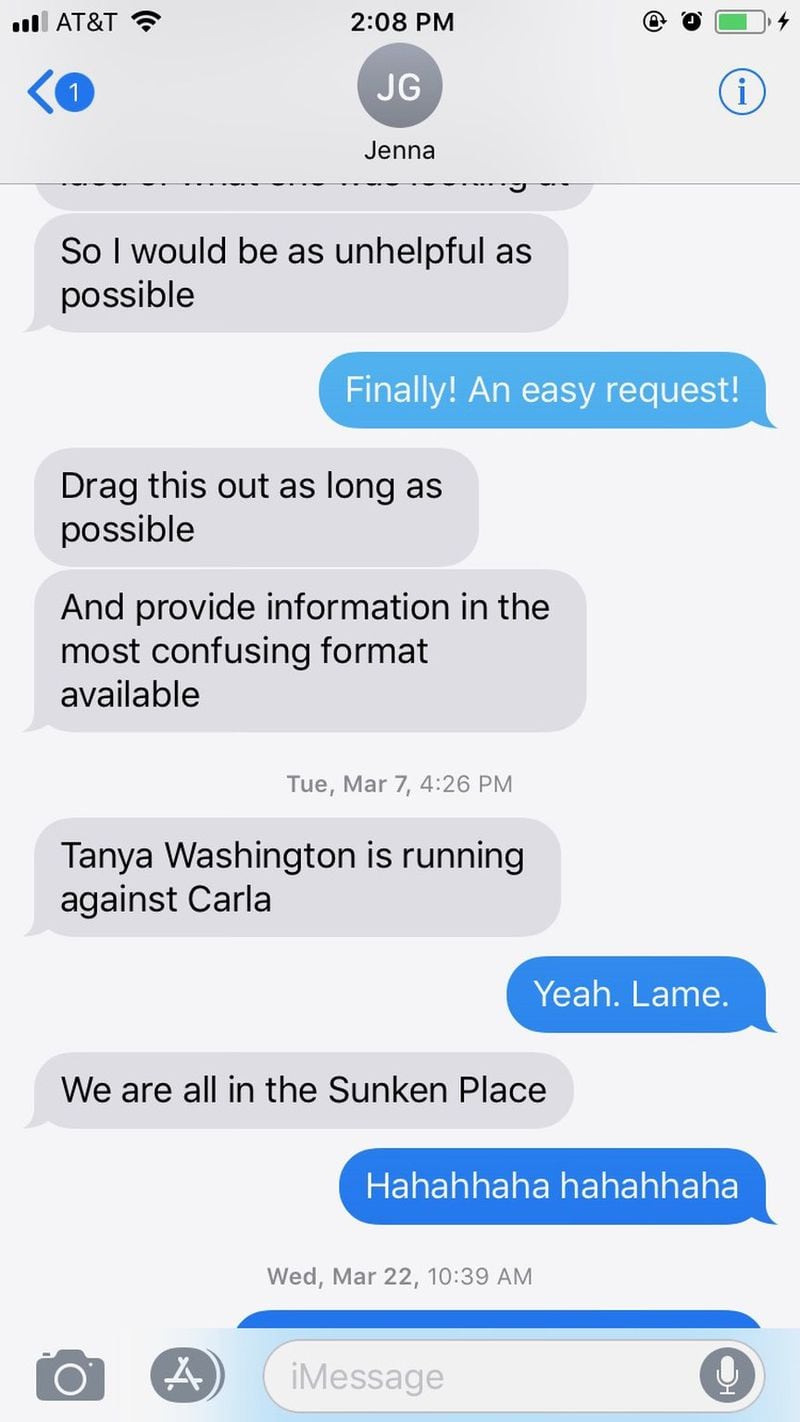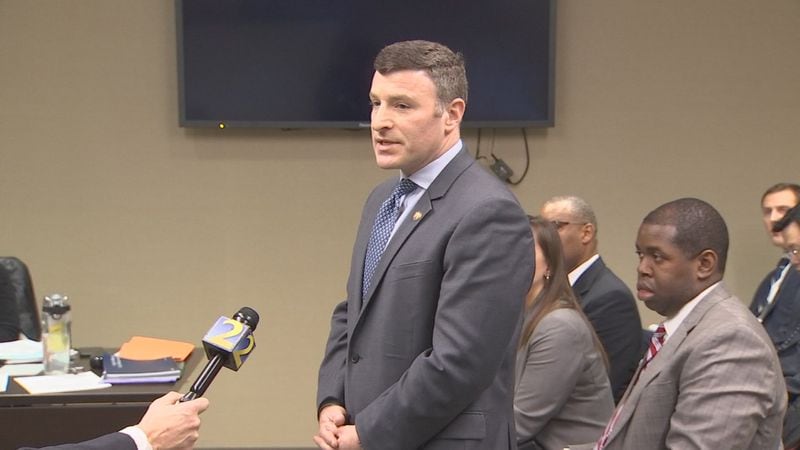The Atlanta Journal-Constitution and Channel 2 Action News filed a complaint Wednesday with Georgia Attorney General Chris Carr alleging “a culture of political interference” with open records requests at Atlanta City Hall, and requesting mediation to implement reforms for repeated violations of state law.
The complaint outlines 10 examples of alleged violations of the Georgia Open Records Act and “a pervasive culture of non-compliance” dating to July 2016. The AJC and Channel 2 seek mediation through Carr’s office to create enforcement measures to ensure compliance with the law and the appointment of an independent public records officer who would be free from political meddling.
The GBI opened a criminal investigation into the city's handling of open records requests in March following reports by the AJC and Channel 2 that experts said revealed potentially criminal behavior within the city's communications and law departments to delay production of public records and to create new documents resembling legal invoices to satisfy an AJC records request last year.
“Recent revelations illustrate that public officials have interfered with, caused delay in, or intentionally obstructed the production of public records — particularly when WSB-TV or the AJC sought public information that city officials perceived as politically embarrassing or inconvenient,” the complaint from attorney Michael Caplan said.
On Tuesday, Mayor Keisha Lance Bottoms announced steps to improve transparency within city government, including a new online portal for residents to search for city expenditures. Bottoms said the system would also allow City Hall to be more responsive to open records requests.
Bottoms also asked for resignation letters this week from more than two dozen senior city officials, all holdovers from former Mayor Kasim Reed, and two have already been accepted: Communications Director Anne Torres and Chief Financial Officer Jim Beard have left city employment. Bottoms said she would accept some of the other resignation letters, while others will be retained and some department heads might be reassigned as she builds a new leadership team.
COMPLETE COVERAGE: Atlanta City Hall shakeup
“Mayor Bottoms has been committed to transparency, opening the doors of city hall to the public and the media,” the mayor’s office said in a statement. “We look forward to a robust dialogue with not only the AJC, WSB and the Attorney General on this issue, but all members of the press.
“Mayor Bottoms is actively reviewing several proposals to reevaluate the City’s current open records processes and looks forward to building on the work that has already been done to strengthen transparency.”
Precedents for mediation
The AJC/Channel 2 request for mediation by the attorney general is a rare step for media organizations to have to take to obtain records that should be readily available under state law. But it is not without precedent.
The AJC pursued legal remedies with the Attorney General’s Office following persistent attempts by the city to stymie open records requests during the administration of former Mayor Bill Campbell, which at the time was under a federal corruption investigation.
More than a decade ago, the AJC and Channel 2 also filed complaints with the AG’s office against backers of the city’s bids for the NASCAR Hall of Fame and the 2009 Super Bowl.
In those cases, Central Atlanta Progress and the Metro Atlanta Chamber, respectively, tried to keep details of the bids secret, despite the public involvement, and the fact that private organizations prepared the bids for public agencies and called for substantial taxpayer spending.
Then-Attorney General Thurbert Baker later sued the groups for compliance and won the case. The court’s ruling was later upheld by the Georgia Court of Appeals.
The 13-page complaint filed Wednesday also outlines efforts to hinder journalists’ attempts to obtain records as mundane as a municipal court judge’s schedule and the complete personnel file of a city department head. In some cases, the city delayed responses for months, only to provide incomplete records, the complaint states.
The city "slow-walked" records and otherwise attempted to thwart reporting intended to provide a check on local government, said Charles Davis, the dean of the Grady College of Journalism and Mass Communication at the University of Georgia.
“In an era in which cynicism about government runs rampant, the antidote to that is transparency,” Davis said. Attempts to throttle reporting, he said, shows “the system is broken.”
“Public access belongs not only to the media but the citizenry,” Davis said. “What odds would the citizen have to get information when [the city] would go to such lengths to deny information to the media?”
GBI investigates records compliance
In March, Carr asked the GBI to investigate text messages between Jenna Garland, a former press secretary for former Mayor Reed, and Lillian Govus, a former communications staffer in the city's watershed department. The messages showed the women coordinating a delayed release of public information requested by Channel 2.
Channel 2 requested water billing records for Reed, his brother Tracy and city council members, including city’s new mayor, Keisha Lance Bottoms. The request prompted Garland to instruct Govus to “be as unhelpful as possible” and to “drag this out as long as possible” when fulfilling the request.
Garland also told Govus on March 7, 2017, to “provide the information in the most confusing format available.”
The GBI probe soon expanded to matters involving the city's law department after an AJC investigation last month showed City Attorney Jeremy Berry provided the newspaper with documents purported to be legal invoices that weren't the actual invoices submitted to the City of Atlanta by its law firm.
Last year, the AJC requested legal bills the city incurred from an outside law firm to respond to the ongoing federal bribery investigation of City Hall, which so far has resulted in multiple guilty pleas.
Berry provided documents that he said showed the costs incurred by the city from law firm Baker Donelson as part of the city's response to the pay-to-play scandal. Berry presented the documents as invoices, but a front-page AJC investigation showed the documents weren't the actual invoices.
The AJC found city officials during Reed’s administration concealed billing records for the bribery probe in the account of a different city legal matter and that Berry directed the creation of new documents resembling invoices in an attempt to satisfy the AJC’s records request.
Berry defended the documents as summaries permitted under the Open Records Act and said he acted in good faith. But experts said the actions ranged from unethical to potentially criminal.
A GBI agent involved in the investigation declined to comment.
New procedures called for
Greg Lisby, a Georgia State University professor of communication, who teaches communication law, said "City Hall has a history of not standing up for the public's best interest."
“The fact of the matter is without open records you cannot have effective government in a democracy. Period,” Lisby said.
The AJC and Channel 2 want the city to acknowledge past non-compliance, adopt new procedures and amend the city’s ethics code addressing open records compliance.
The news organizations request that the city allocate “adequate resources” and staff to support the proposed independent records officer to meet the requirements of state law. The complaint calls for mandatory open records training for relevant city employees, monitoring of compliance and enforcement of non-compliance, if so required.
The AJC and Channel 2 also seek reimbursement of substantial legal fees in connection with open records matters during the past two years.
Lisby said he hopes Bottoms follows through on promises to improve transparency. Though he is unsure the complaint ultimately will achieve all its goals, Lisby said a crackdown by Carr would echo throughout the state.
“It would be a loud message, rather than a whisper,” he said.
Continuing investigative coverage
The GBI opened a criminal investigation into the city of Atlanta’s handling of open records requests after The Atlanta Journal-Constitution and Channel 2 Action News first reported about text messages between city communications staffers that appeared to coordinate a delayed release of records. The AJC’s reporting about purported legal invoices released by the city in response to an open records request prompted an expansion of the criminal investigation. Count on the AJC for continuing coverage of this important story.
Inside the AG complaint
Below are some examples of actions by city of Atlanta officials that lawyers for the AJC and Channel 2 Action News allege violate the Georgia Open Records Act:
In July 2016, Channel 2 sought watershed department records for meter readings on accounts with the status "Vacant – shut off" from March to June 2016. After 10 weeks of negotiations, the city provided incomplete records, including a database that omitted columns of data. A source told Channel 2 the spreadsheets were incomplete, and the station insisted on obtaining the full documents. Lawyers for Channel 2 ultimately intervened in October 2016 and the city complied the next month only after the station spent thousands of dollars on legal fees.
In Spring 2017, Channel 2 sought water billing records for several city officials. In response to the open records request, former press secretary Jenna Garland and former watershed department staffer Lillian Govus communicated by text and coordinated delayed release of records, with Garland instructing Govus to "Drag this out as long as possible. And provide information in the most confusing format available." Channel 2 and the AJC obtained the texts this year and published stories in March that triggered the GBI investigation into the city's handling of open records requests.
In July 2017, the AJC requested records relating to then-city CFO Jim Beard's government issued purchasing card. The city initially said it would charge the AJC $240 to produce records, which the paper agreed to pay. The city failed to produce responsive records for six months. The AJC renewed its request Jan. 26 and added a request for records concerning former Mayor Kasim Reed. The city said it would provide records Feb. 16, and then said the records wouldn't be made available until March 19. When the AJC obtained the records, the paper learned Reed had reimbursed the city for nearly $12,000 in purchases during the exact years for which the AJC sought records, and that checks from Reed were dated March 9. Reed has said his reimbursements were not related to the AJC's records request.
In October 2017, an AJC reporter requested certain records pertaining to people housed in the city jail and for published municipal court judicial calendars. The city said it would require 30 to 45 days to produce the records, which should be readily available. Another city official said the request should have gone through the mayor's communications office, not the court, and the reporter sought assistance from the city attorney. When the records ultimately were provided in mid-December, they did not include some of the requested materials.
About the Author











